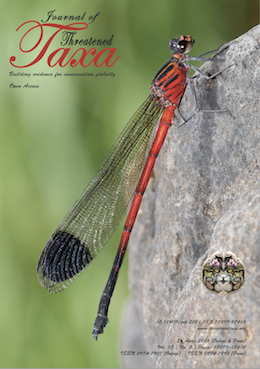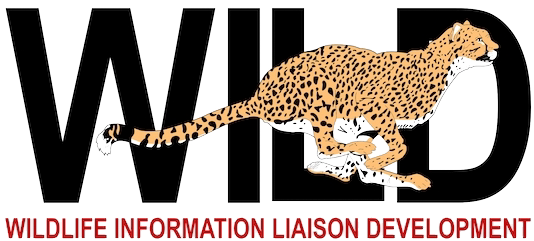Marine mammal strandings in the northern Palk Bay from 2009 to 2020
DOI:
https://doi.org/10.11609/jott.6302.13.5.18313-18318Keywords:
Mammal stranding, Dugong dugon, Seagrass, PalkBay, Fishing net, OMCARAbstract
Globally, the marine mammal population has been under threat due to various human activities. Data on stranding of these animals that are important for effective conservation planning and management, however, are not available in most of the developing countries. This paper presents observations on marine mammal strandings in northern Palk Bay, the southeastern coast of India over the last decade. In total, 21 stranding events consisting of 23 marine mammals were observed from 2009 to 2020. These stranded mammals include a Humpback Dolphin, a Blue Whale, two Finless Porpoises, and 19 Dugongs. The evident reason for the death of the dugongs and the porpoise being fishing activities, regulations on fishing practices, and intensive monitoring of the existing dugong population and their habitats are necessary. This study recommends for establishment of conservation reserve, and setting up district-level marine mammal rescue and release units in Nagapattinam, Tiruvarur, Thanjavur, Pudukkottai, and Ramanathapuram districts, comprising fishers and line departments. These units need to be sufficiently equipped in terms of equipment and infrastructure, and periodical technical training and workshops on marine mammal rescue and release procedures to quickly respond and handle marine mammal strandings in the area.
References
Aragones L.V., M. A. Roque, M. B. Flores, R. P. Encomienda, G. E. Laule, B. G. Espinos, F. E. Maniago, G.C. Diaz, E.B. Alesna & R.C. Braun (2010). “The Philippine Marine Mammal Strandings from 1998 to 2009: Animals in the Philippines in Peril?” Aquatic Mammals 36: 219–233.
Balaji, V. (2018). Acoustic survey of seagrass beds in northern Palk Bay, India. Indian Journal of Geomarine Sciences 47(08): 1607–1615.
Gopalakrishnan, A. (2014). Training manual Dealing with Marine Mammals Stranding in India. GOI-UNDP-GEF Sponsored Training Programme. Central Marine Fisheries Research Institute (CMFRI), Kochi, 102pp.
Heinsohn, G.E. & W.R. Birch (1972). Foods and feeding habits of the Dugong, Dugong dugong (Erxleben), in northern Queensland, Australia. Mammalia 36: 414–422.
Jeyabaskaran, R., E. Vivekanandan & V. Kripa (2013). Marine Mammal Research and Conservation in India, pp. 105–112. In: ICAR funded Short Course on “ICT -oriented Strategic Extension for Responsible Fisheries Management, 05–25 November 2013, Kochi.
Kannan, L., T. Thangaradjou, & P. Anantharaman. (1999). Status of seagrasses of India. Seaweed research and utilisation 21(1&2): 25–33.
Kirkman, R. (1997). Why ecology cannot be all the things to all people: the “adaptive radiation” of scientific concepts. Environmental Ethics 18: 375–390.
Marine Mammal Research and Conservation Network of India http://www.marinemammals.in/database/sightings-and-strandings/. Accessed on 23 March 2020.
Marsh, H., P.W. Channells, G.E. Heinsohn & J. Morrissey (1982). Analysis of stomach contents of dugongs from Queensland. Australian Wildlife Research 9(1): 55–67. https://doi.org/10.1071/WR9820055
Randage, S.M., A. Alling, K. Currier & E. Heywood (2014). Review of the Sri Lanka blue whale (Balaenoptera musculus) with observations on its distribution in the shipping lane. Journal of Cetacean Research Management 14: 43–49.
Sathasivam, K. (2000). ‘Records of Marine Mammals from India’. Blackbuck 16: 2–3.
Yashpal, A., T. Ketan & C.N. Pandey (2015). Status of Dugong (Dugong dugon) in Gulf of Mannar and Palk Bay, Tamil Nadu, India. Indian Journal of Geo-Marine Science 44(9): 1442–1448.
Downloads
Published
Versions
- 28-04-2021 (2)
- 26-04-2021 (1)
Issue
Section
License
Copyright (c) 2021 Vedharajan Balaji, Veeramuthu Sekar

This work is licensed under a Creative Commons Attribution 4.0 International License.
Authors own the copyright to the articles published in JoTT. This is indicated explicitly in each publication. The authors grant permission to the publisher Wildlife Information Liaison Development (WILD) Society to publish the article in the Journal of Threatened Taxa. The authors recognize WILD as the original publisher, and to sell hard copies of the Journal and article to any buyer. JoTT is registered under the Creative Commons Attribution 4.0 International License (CC BY), which allows authors to retain copyright ownership. Under this license the authors allow anyone to download, cite, use the data, modify, reprint, copy and distribute provided the authors and source of publication are credited through appropriate citations (e.g., Son et al. (2016). Bats (Mammalia: Chiroptera) of the southeastern Truong Son Mountains, Quang Ngai Province, Vietnam. Journal of Threatened Taxa 8(7): 8953–8969. https://doi.org/10.11609/jott.2785.8.7.8953-8969). Users of the data do not require specific permission from the authors or the publisher.





